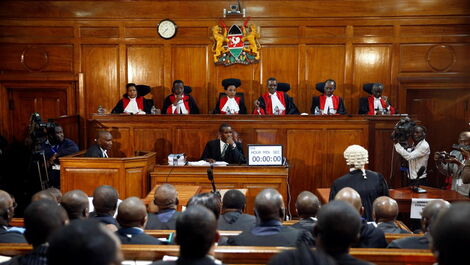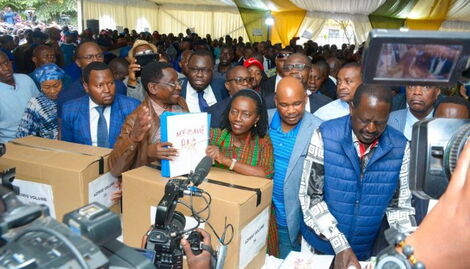-
The Judiciary has assured Kenyans that it is working to fix an electronic system failure that was experienced for the better part of Wednesday, August 24.
The systems which support the electronic filing of documents, services, search of cases, payment, and receipting experienced downtime from morning hours.
In a statement dated Wednesday, August 24, the Judiciary said its e-filing and case tracking system were experiencing downtime.
Additionally, the Judiciary confirmed that its technical team was working around the clock to restore the system.
 Supreme Court Judges during a past court hearingFILE
Supreme Court Judges during a past court hearingFILEFurther, the Judiciary directed that to avoid disruptions, it had reverted to the guidelines on manual operations during system breakdown issued by the Chief Registrar on August 23.
The e-filing system of cases was officially launched by former Chief Justice, David Maraga, on July 1, 2020. This was part of the Judiciary's efforts, to increase the use of technology in all its functions and achieve higher levels of efficiency and convenience for all stakeholders.
The Kenyan court system is anchored in common law, which is characterized by paper-based procedures and physical court appearances.
However, the disruptions caused by the pandemic made the court system to delay its mandate of delivering justice, forcing the judiciary to adopt measures to mitigate the effects and ensure continuous access to justice.
To actualize this, electronic systems were launched. The e-filing system helps to allow the court users to submit e-documents to the courts, perform self assessment and make payments to the court, cash bail, or court deposits.
The second system is the the case Tracking System. This is a registry automation system that tracks the life cycle of a case, indicates the status of a case, generates the Cause list, keeps an e-diary, and generates reports.
The case-tracking system is important in helping court users to track cases assigned to the office for hearings, and manage caseloads and case works.
The Judiciary says for applications under certificate of urgency and time-bound pledges are supposed to forward the same through the respective court's station email address and copy to the deputy registrar for processing(automationdeputyregistrar(at)court(dot)go(dot)ke)
The system, adopted in 2020, has attracted both praise and criticism in equal measure from court users.
 from right; Azimio flagbearer Raila Odinga, prof. Makau Mutua and Azimio deputy presidential candidate Martha Karua filing their petition at the supreme court on August 22, 2022 By Oscar Nalyanya, KENYANS.CO.KE
from right; Azimio flagbearer Raila Odinga, prof. Makau Mutua and Azimio deputy presidential candidate Martha Karua filing their petition at the supreme court on August 22, 2022 By Oscar Nalyanya, KENYANS.CO.KE
East Africa
About IEA Media Ltd
Informer East Africa is a UK based diaspora Newspaper. It is a unique platform connecting East Africans at home and abroad through news dissemination. It is a forum to learn together, grow together and get entertained at the same time.
To advertise events or products, get in touch by info [at] informereastafrica [dot] com or call +447957636854.
If you have an issue or a story, get in touch with the editor through editor[at] informereastafrica [dot] com or call +447886544135.
We also accept donations from our supporters. Please click on "donate". Your donations will go along way in supporting the newspaper.
Our Offices
London, UK
+44 7886 544135
editor (@) informereastafrica.com
Slough, UK
+44 7957 636854
info (@) informereastafrica.com
Latest News
© Informer East Africa - IEA Media Ltd. Designed by InspireTheme.






